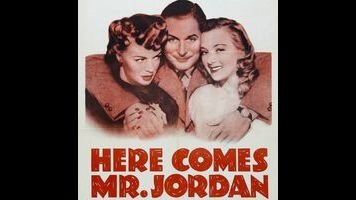Neither Warren Beatty nor Chris Rock could improve upon Here Comes Mr. Jordan

Originally released at a time of national anxiety—four months before Pearl Harbor—the comic fantasy Here Comes Mr. Jordan positively radiates reassurement, in the form of a beatific and perpetually amused Claude Rains. Best known at the time for playing villains like Prince John in The Adventures Of Robin Hood and Senator Paine in Mr. Smith Goes To Washington (his iconic role in Casablanca came the following year), Rains plays it sublimely paternal as Mr. Jordan, the bureaucrat who manages heaven’s new arrivals. Every word he utters, in concert with the warm smile that rarely leaves his face, conveys the message that everything’s going to be all right. Indeed, “Everything’s going to be all right” is Mr. Jordan’s very last line in the movie. World events continued to contradict this positive message, however, which might be why Here Comes Mr. Jordan was only modestly successful, if that, at the box office. (Figures from the era are difficult to come by, as they weren’t widely reported then, but it wasn’t among 1941’s 20 or so top-grossing films.)
In any case, Mr. Jordan isn’t the film’s protagonist, his titular prominence notwithstanding. That would be Joe Pendleton (Robert Montgomery), a prizefighter and amateur pilot who’s mistakenly collected before his time by an overzealous new angel (the ever-splenetic Edward Everett Horton) after Joe’s plane goes into a seemingly fatal nosedive. Unfortunately, Joe’s body gets cremated before the mix-up can be resolved, so Mr. Jordan places Joe’s spirit inside the fresh corpse of a murdered business tycoon named Bruce Farnsworth, who then miraculously returns to life. To the rest of the world (though not to the viewer, who sees Montgomery throughout), Joe looks and sounds like Farnsworth. Inside, however, Joe is still Joe, with all his old memories, and he still very much wants to be the world champ, even if that means getting his flabby new body into shape. He’s also not so keen on maintaining Farnsworth’s corruption, especially since that would mean hurting Bette Logan (Evelyn Keyes), a young woman for whom Joe instantly falls.
If the above synopsis sounds familiar, that’s because Here Comes Mr. Jordan has been remade twice so far. Heaven Can Wait (1978), starring and co-directed by Warren Beatty, made Joe a football player; Down To Earth (2001), with Chris Rock, turned the character, renamed Lance, into a stand-up comic. The original version remains the finest but is still a slightly offbeat choice for the Criterion Collection, which it joins next week. Director Alexander Hall is nobody’s idea of an auteur; the rest of his filmography has been largely forgotten, and the Oscar nomination he received for his functional work here (notable primarily for depicting heaven as a dry-ice limbo) looks downright absurd nestled alongside the likes of Orson Welles (Citizen Kane), Howard Hawks (Sergeant York), and winner John Ford (How Green Was My Valley). Here Comes Mr. Jordan isn’t even especially well cast either, apart from Rains. The urbane Montgomery is out of his element as a Brooklyn tough guy—the role would have been ideal for John Garfield—and Keyes never makes Bette distinctive enough to justify Joe’s obsession with her, which is what makes him agree to become Farnsworth in the first place (and then attempt to defy Mr. Jordan and remain Farnsworth).
Still, the film’s sturdy comic premise, derived from a stage play by Harry Segall, provides plenty of laughs, especially once Joe reveals his secret to his former manager, played with terrific comic gusto by James Gleason. (Gleason was justly nominated for a Best Supporting Actor Oscar but lost to How Green Was My Valley’s Donald Crisp.) Joe being recognized in his new form thanks to his ineptitude on the saxophone is an inspired touch, as is a recurring bit in which Gleason’s manager attempts to hold one-sided conversations with Mr. Jordan, who he can’t see or hear (and who is often not actually present at the time). And whenever the movie needs a shot in the arm, Rains tends to reappear, putting all the chaos in perspective with his serene twinkle. Mr. Jordan’s various machinations don’t entirely make sense—there seems to have been a genuine mistake made with Joe (i.e., he was meant to live another 50 years as Joe Pendleton), yet everything ultimately appears to be preordained, said “mistake” included—but that can presumably be filed under “mysterious ways,” and Rains sells it all beautifully. For the space of 94 minutes, he makes it feel as if a benevolent force is in control, ensuring that things will work out. That’s a message that everyone can use from time to time.